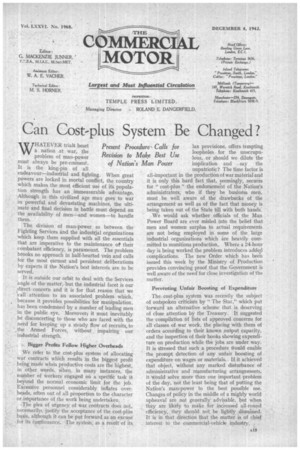Can Cost-plus System Be Changed?
Page 17

If you've noticed an error in this article please click here to report it so we can fix it.
WHATEVER trials beset a nation at war, the problem of man-power must always be pre-eminent. it is the king-pin of all endeavour—industrial and fighting. When great powers are locked in mortal conflict, the country which makes the most efficient use of its population strength has an immeasurable advantage. 'Although in this civilized age man goes to war in powerful and devastating machines, the ultimate and final decision in battle must depend on the aivailability of men—and women—to handle them.
The division of man-power, as between the Fighting Services and the industrial organizations which keep them supplied with all the essentials that are imperative to the maintenance of' their combatant efficiency, is paramount. The problem brooks no approach in half-hearted vein and calls for the most earnest and persistent deliberations by experts if the Nation's best interests are to be served.
It is outside our orbit to deal with the Services angle of the matter, but the industrial facet is our direct concern and it is for that reason that we call attention to an associated problem which, because it provides possibilities for manipulation, has been condemned by a number of leading men in the public eye. Moreover, it must inevitably be disconcerting to those who are faced with the need for keeping up a steady flow of recruit to .the Armed Forces, without impairing our industrial strength, , . Bigger Profits Follow Higher Overheads We refer to the cost-plus system of allocating war contracts which results in the biggest profit being made when productive costs are the highest, in other words, m"then, in many instances, the number of workers engaged on a specific task iS beyond the normal economic limit for the job. 'Excessive personnel considerably inflates overheads, often out of all proportion to the character or importance of the work being undertaken. The plea of urgency of war contracts does not, necessarily', justify the acceptance of the cost-plus basis, although itcan be put forward as an excuse for its ontinuance. The system, as a result of its lax provisions, offers tempting loopholes for the unscrupulous, or should we dilute the implication and say the unpatriotic? The time factor is all-important in the production of war material and it is only this hard fact ,that, seemingly, secures for " cost-plus " the endorsement of the Nation's administrators, who if they be business men, must be well aware of the drawbacks of the arrangement as well as 'of the fact that money is being taken out of the State till with both hands. We would ask whether officials of. the Man Power Board are ever misled into the belief that men and women surplus to actual requirements are not being employed in some of the large industrial organizations which are heavily committed to munitions production, Where a 24-hour day is being worked the problem introduces adde0 complications. The new Order which has been issued this week by the Ministry of Production provides convincing proof that the Government is well aware of the need for close investigation of the matter.
Preventing Unfair Boosting of Expenditure The cost-plus system was recently the subject of outspoken criticism by " The Star," which put • forward an alternative scheme that is deserving of close attention by the Treasury. It suggested the compilation of lists of approved concerns for all classes of war, work, the placing with them of orders according to their known _output capacity, and the inspection of their books showing expenditure on production while the jobs are under way. It is stressed that such a procedure stirould enable the prompt detection of any unfair boosting of expenditure on wages or materials. If it achieved that object, without any marked disturbance of administrative and manufacturing arrangements, it would solve more than one important problem of the day, not the least being that of putting the Nation's manpower to the best possible use. Changes of policy in the middle of a mighty world upheaval are not generally advisable, but when they are likely to make for increased all-round efficiency, they should not be lightly dismissed. It is in that direction that the matter is of chief interest to the commercial-vehicle industry.




















































